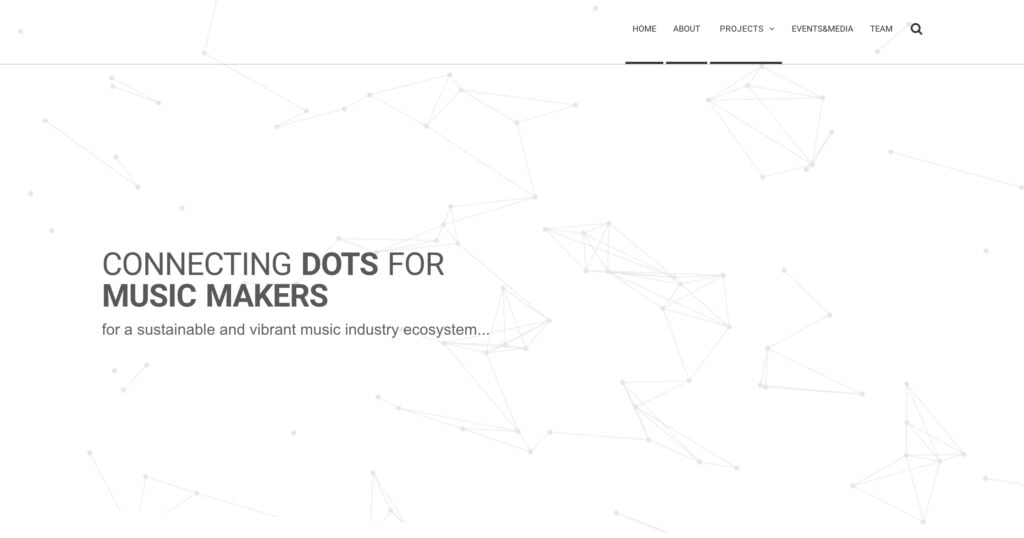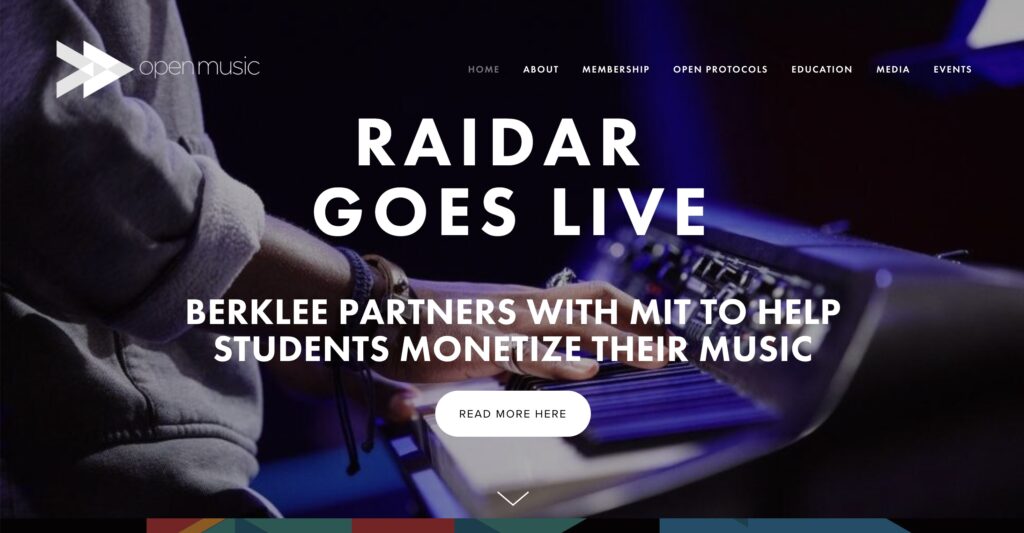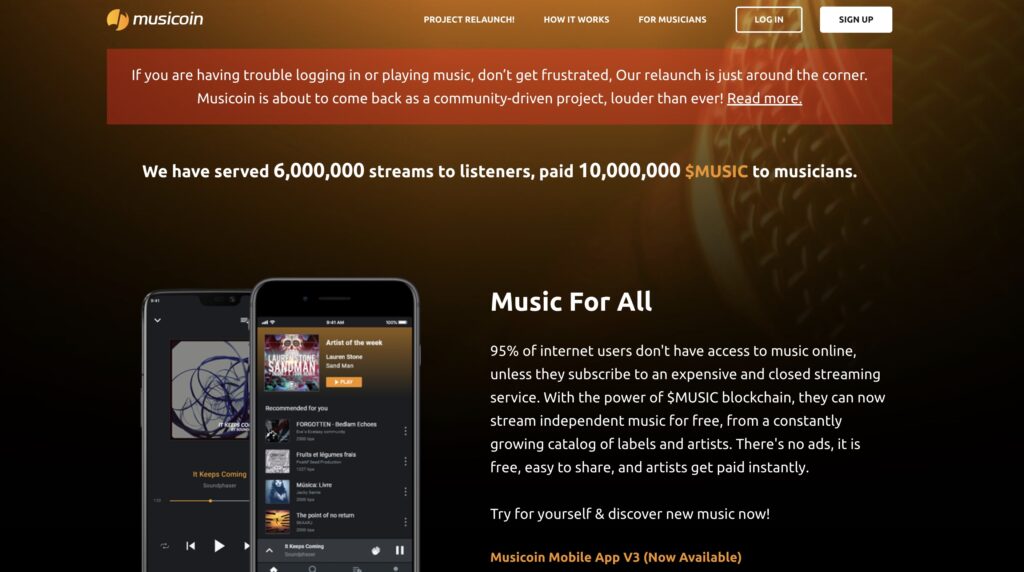
How can Blockchain Improve the Music Industry?
Are you interested in learning how Blockchain can improve the music industry?
In this article, we will discuss the blockchain music industry.
To better understand the blockchain revolution for the Music sector, it is important to first look at problems in the music industry that blockchain technology can help resolve.
The problems in the music industry
This Statista report predicted how the global music industry would grow in 2012-2023. The total revenue of the global music industry was estimated to grow to $65 billion in 2023. That’s a significant increase from the $51 billion it generated back in 2017.
While the above statistics indicate a healthy growth rate, there are times when such statistics can mask underlying structural problems within an industry. This is true for the music industry.
The music industry has seen many disruptions over the years. Major labels like Universal Music Group, Warner Music Group, and Sony BMG once dominated the whole scene. They managed the music rights and reaped much of the profits. These and other record labels also coordinated with the distributors and managed many other aspects, too.
Napster, a peer-to-peer (P2P) file-sharing service for digital music, totally upended this model by disrupting the traditional music business model. Legal battles followed, and in a win for the old giants, Napster was forced to discontinue.
Further music streaming platforms brought in more disruptions. Spotify, Apple Music, YouTube Music, Amazon, Deezer, SoundCloud, and Tidal led this round of disruptions and managed to succeed where Napster had failed in trade surrounding music.
Most of these disruptions didn’t do much to improve the payouts that artists received. Artists continue to earn less than they should, particularly the less well-established ones. This problem continues to plague the industry to this day.
Check out these examples:
A. Report about the main challenges in the music industry
The top 1% of artists earn 77% of the total income received by artists. This means that an artist outside this top bracket won't earn anything in the way of a significant income.
In fact, with only a few exceptions, most of the top 1% of artists still only get rewarded with a minuscule amount of revenue as the record labels keep most of it! While the above-mentioned numbers are from 2017, this general trend continues even to this day.
Most top artists earn around 18% of the total revenue generated by their music. The remainder only earn a maximum of 6%, something that seems grossly unfair!
When you review the numbers of the global music industry by country, these figures aren’t any better. The entire industry managed to gross $43 billion back in 2017, representing a healthy growth rate over previous years. However, artists only earned a meager 12%, on average, of that revenue!
Even worse, artists often don’t know how their royalty payments are calculated since the industry isn’t transparent.
The simple fact is that the industry has too many middlemen – record labels, radio companies, and streaming services gobble up a significant part of the total revenue.
Artists that sell only 1 album per year make up 15% of all the artists who work in the industry. A staggering 82% of artists are not even signed up with any record labels. Moreover, 33% of artists don’t sell any albums at all!
B. Media reports from 2020 highlighting the issues in the music industry
Reports from 2020 indicate that the music industry continues to face challenges. This report from theconversation.com states that even famous musicians continue not to earn sufficient returns on their work.
Why does this happen? “The Conversation.com” report states the following:
- Streaming services like Apple Music and Spotify earn revenues from subscription fees and advertising.
- Music streaming platforms enter into contracts with record labels to access the content.
- The streaming platforms retain 30% of the revenue from streaming.
- Music publishers get 15% of the revenue. They represent songwriters.
- Record labels get 55% of the revenue. They pay a percentage of this amount to the artists; however, they still take the lion's share. You can see how artists get a significantly reduced amount.
- However, multiple complexities exist on streaming platforms concerning how artists are rewarded for users listening to their work. This further reduces the amounts earned by artists.
It’s clear that the industry needs to change. In short, it needs to increase the pool of talent and start giving them fairer pay.
Let's talk about opportunities!
A defining characteristic of the free-market economy is that opportunities can be found in finding solutions to problems! So, how does this apply to the music industry?
The present system requires artists to depend on middlemen like record labels, radio companies, and streaming services. Their success depends on how these middlemen market the artists' work.
But what if artists could directly interact with listeners? The result would be that consumers would now get direct access to a new crop of talent and allow artists to discover whole new markets.
Direct interaction between artists and consumers would also eliminate middlemen from the revenue stream. This would improve the income of the artists and reduce the cost for listeners to access music.
A technology that puts a premium on transparency while also facilitating the ability of artists to have more control over the money they make would revolutionize the industry. Read more about this in "Blockchain could help musicians make money again."
The transparency and efficiency offered by blockchain allow for fair incentives to be given to all stakeholders. This can bring much-needed advancements and fairer treatment for all parties.
Can the music industry transform itself using blockchain technology?
Blockchain technology is now firmly out of the shadows thanks to the cryptocurrency boom of Bitcoin, Ethereum, and the 1,000+ other digital currencies. More and more industries, governments, and non-governmental organizations are exploring how to use blockchain solutions to enhance efficiency as well as increase transparency.
It offers the following:
1. Decentralization
Blockchain solutions work on a decentralized network with no one central server. This ensures every participant has equal authority in the network. Furthermore, hackers can't alter data records by taking over the central server as this would require them to take control of 51%+ of the network's nodes.
2. Data security
Modern cryptography protects the data, e.g., digital signatures are encrypted. This means that hackers can’t even gain access to data either.
Hackers find it practically impossible to tamper with the blockchain network because of the consensus algorithm. For example, the ‘Proof of Work’ (POW) consensus algorithm would require a hacker to possess enormous computing power to overpower the decentralized network, something which, without the yet-invented quantum computer, isn’t possible.
Read “Proof of Work vs Proof of Stake comparison” to learn more.
3. A reduced role for the “middlemen”
Decentralization eliminates the need for middlemen; therefore, a blockchain music distribution platform would be able to connect artists directly with listeners. Since modern cryptography and consensus algorithms protect data, this assures that even the most basic blockchain solution will be protected against fraud.
4. Transparency
The distributed ledger of blockchain makes it easier to share data with a wide range of stakeholders. Stakeholders can access data on a real-time basis. This fosters transparency. This further reduces the role of the intermediaries.
5. Efficiency
Blockchain networks like Ethereum have introduced smart contracts, i.e., autonomous, tamper-proof solutions (once written to the network) that transfer assets automatically upon fulfillment of a set of predetermined conditions. This would allow for the automation of payments for artists and other processes.
Read more about these possibilities in "What could blockchain do for music?".
NFTs: another opportunity presented by blockchain for artists
NFTs (non-fungible tokens) are cryptographic tokens that are unique and indivisible. In this regard, they vary from other cryptographic tokens.
You can always trade one Bitcoin for another Bitcoin since they are equivalent. One can transact with smaller units of Bitcoin.
However, you can’t trade one NFT for another. You can’t transact with smaller units of an NFT. Such smaller units don’t exist. These attributes make NFTs ideal for tokenizing artworks and digital collectibles.
NFTs are stored on a blockchain network like Ethereum. No one can tamper with them. This helps artists to prove that they have created their artworks. In turn, this helps them to get fair compensation for their work.
Artists in the world of music have entered the world of NFTs. Both mainstream and indie artists have taken to NFTs with enthusiasm.
Existing music blockchain platforms
It's time we review a few platforms that use blockchain in the music industry. This will provide useful ideas to those of you who are considering building a music industry blockchain solution.
Mycelia/ blockchain music platform

Imogen Heap, the Grammy-award-winning artist, launched Mycelia. This blockchain project intends to create a fair and sustainable music industry. Mycelia aims to ensure that all stakeholders receive fair compensation and acknowledgment.
VOISE/ blockchain music platform
VOISE is another blockchain platform for the music industry. It is built on the Ethereum blockchain network. Artists can monetize their work on this P2P network, including setting their own prices. They can provide free samples of their tracks and seek feedback from music enthusiasts.
Artists can upload their content, meaning that users on the P2P network can view/listen to the music. The platform enables artists to receive nearly all the revenue that they generate using the VOISE crypto token.
Open Music Initiative (OMI)

Open Music Initiative (OMI) is a non-profit initiative. It leverages the power of blockchain to identify rightful music rights holders and music creators uniformly.
The project intends to create a new music metadata layer. This layer should foster transparency, and it should be an authoritative source of information. It has created an open-source protocol for this.
Musicoin/ blockchain music streaming platform

Musicoin is a Hong Kong-based music streaming platform. The company uses a blockchain platform to support the creation, consumption, and distribution of music.
Planning to Undertake Blockchain-based Music Platform?
Blockchain technology promises to overcome a lot of challenges faced by music fans and artists due to the traditional business model through a fully decentralized streaming platform.
Blockchain offers transparency and rightful music ownership to artists, enabling them to release music efficiently and get better returns for their work in the market. It also provides rewards to music fans for creating playlists, etc.
An example is Vet'z digital marketplace, which offers Initial Song offering based on blockchain technology to allow artists to share a percentage of their earnings for royalty-based payments.
If you as a business owner, are planning to invest in a blockchain database for a music platform, it is a sound business decision to help you grow and streamline your business.
However, keep in mind that blockchain is an emerging technology, and to build a blockchain solution for the music industry successfully, you will require experienced software developers will an understanding of blockchain distributed ledger technology, blockchain development frameworks, programming languages, etc.
If you do not find the required skills in your product development team, we would advise you to partner with a software development company with experience in developing blockchain in music solutions.
If you are still looking for such competent blockchain development engineers, DevTeam.Space can help you. Write us your initial blockchain music project specifications via this form, and one of our technical managers will get back to you to partner you with the field-expert blockchain developers community.
DevTeam.Space is an innovative American software development company with over 99% project success rate. DevTeam.Space builds reliable and scalable custom software applications, mobile apps, websites, live-streaming software applications, speech recognition systems, ChatGPT and AI-powered solutions, and IoT solutions and conducts complex software integrations for various industries, including finance, hospitality, healthcare, music, entertainment, gaming, e-commerce, banking, construction, and education software solutions on time and budget.
DevTeam.Space supports its clients with business analysts and dedicated tech account managers who monitor tech innovations and new developments and help our clients design, architect, and develop applications that will be relevant and easily upgradeable in the years to come.
Frequently Asked Questions
Blockchain in music technology can improve the music rights marketplace and royalty management platform by introducing transparency in music ownership rights, streamlining royalty payments, increasing music royalties payouts for artists, automation of payments, removing a centralized authority or middle-men, and providing deeper data insights into music lovers' favorite artists, music videos, etc.
NFTs promise improved access to global markets for indie artists and other creators to showcase and sell their art, including music streams. NFTs will let creators of digital assets set their rates and control their availability in the marketplace.
Spotify is planning to add blockchain and NFTs to its streaming service.


